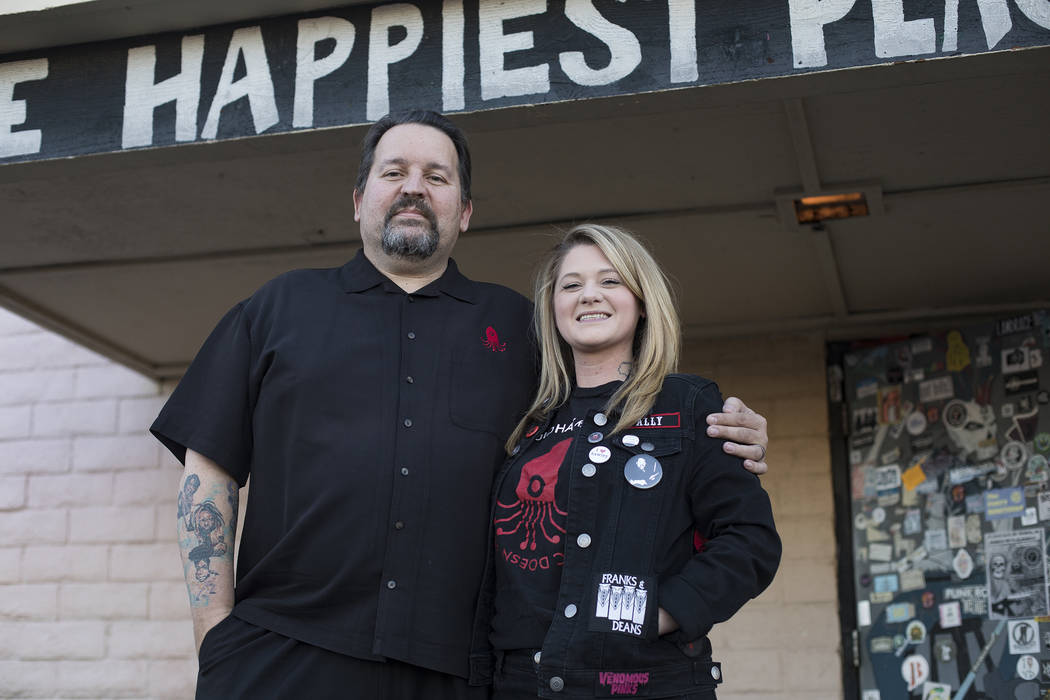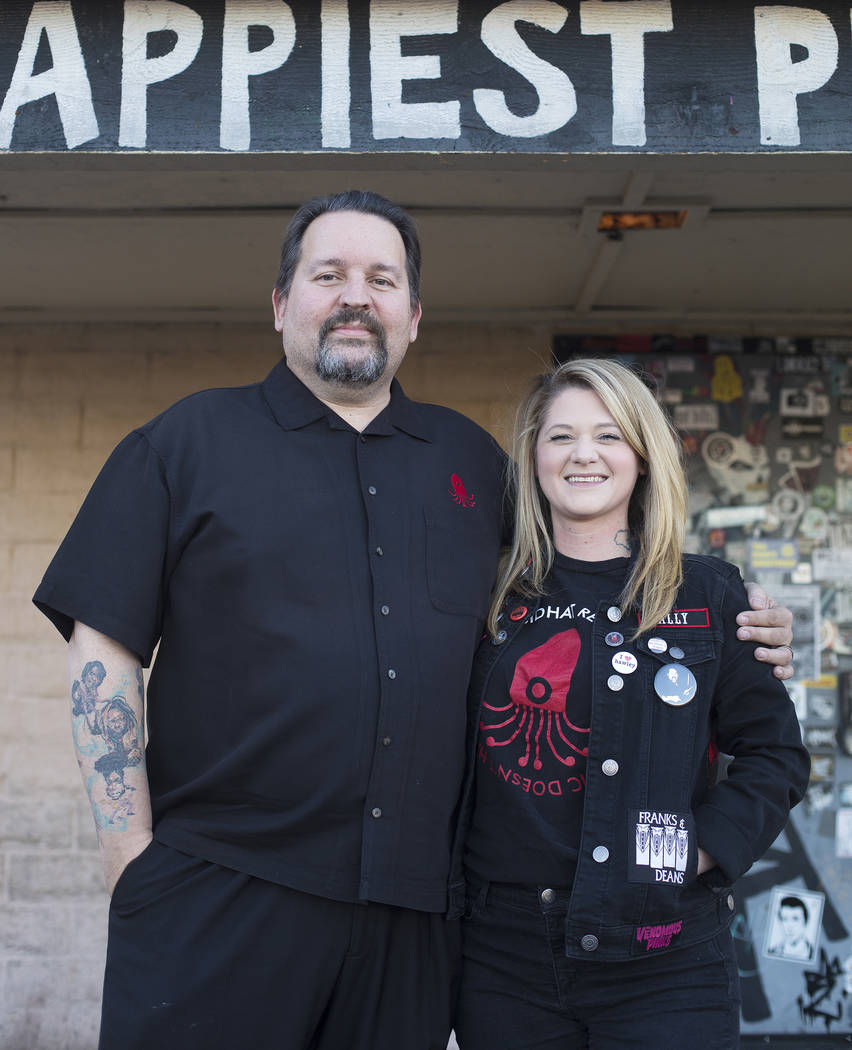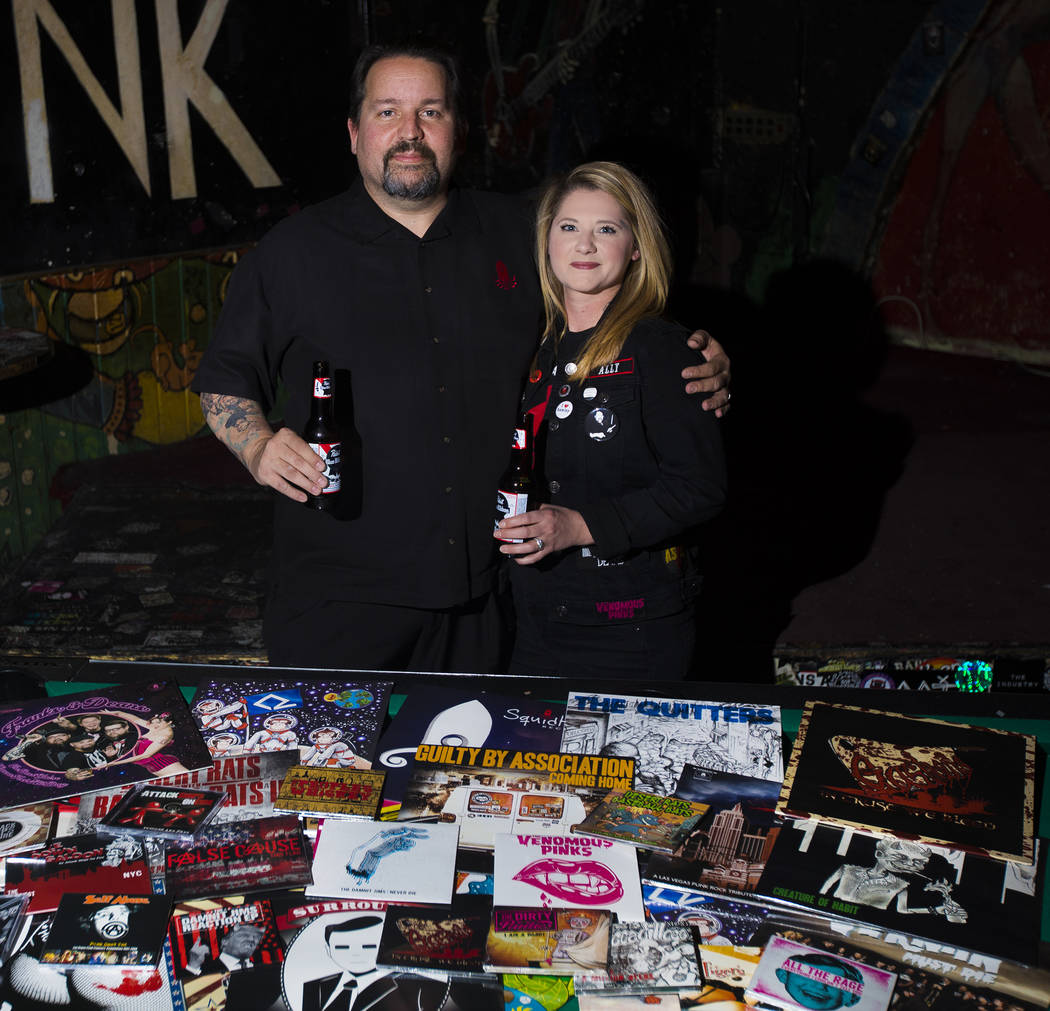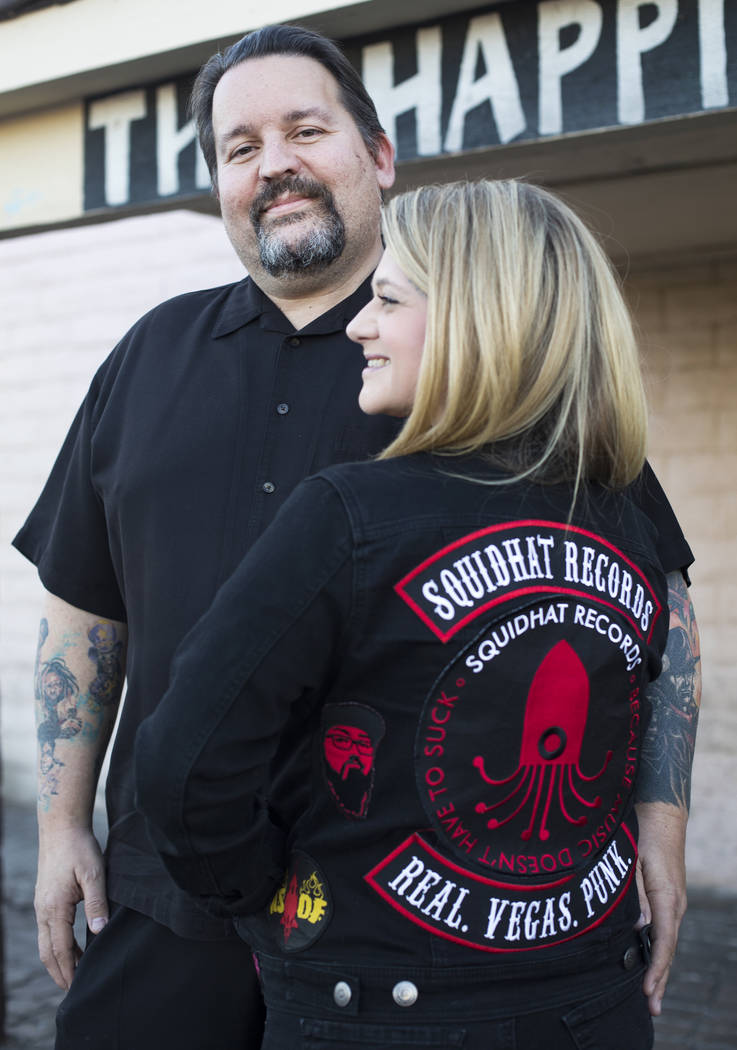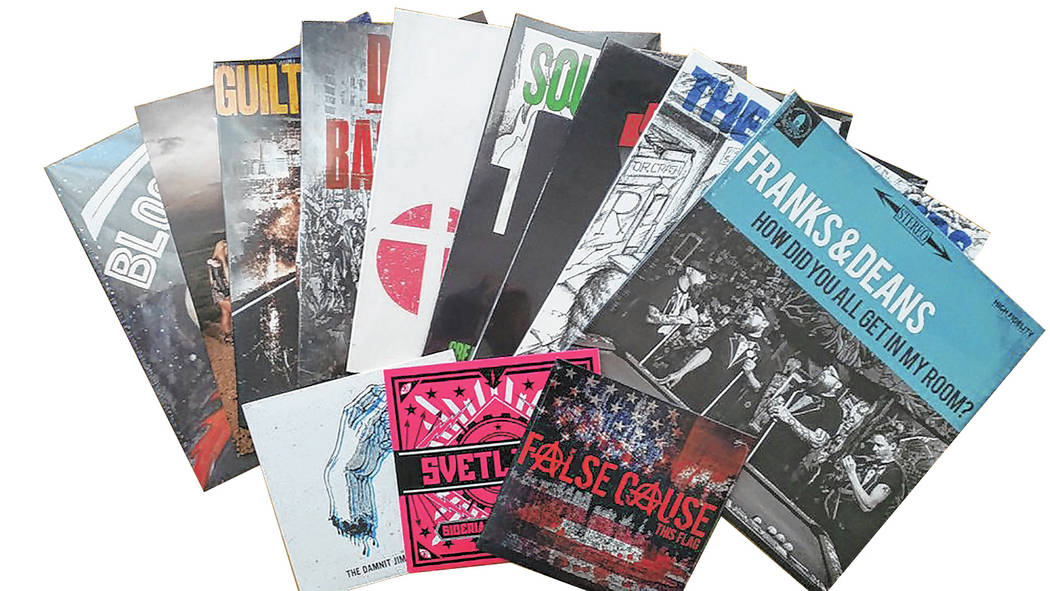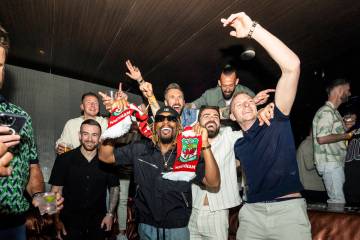Las Vegas indie record label closing after 8-year run
Vegas Voices is a weekly series highlighting notable Las Vegans.
It all started right here, as shots of Jameson came to an end.
At the Double Down Saloon on a weekday evening, Allan Carter revisits the spot where eight years ago this month he devised a plan that would change both his life and the lives of dozens and dozens of local bands.
“I’m sitting there, I’m watching the Dirty Panties play, there were 30-40 people in the room, and they were just amazing that night,” recalls Carter, who was visiting Vegas on a work trip as a wine professional from Portland, Oregon. “I was blown away. Afterward, I went up and asked if they had any merch. They said, ‘No, we don’t have anything.’ I’m like, ‘They need some guidance, they need somebody to say, ‘Hey, you need to do this, this and this.’ ”
With that, the idea for SquidHat Records was born.
One of the best, most prolific and professionally run indie labels Las Vegas has ever seen, SquidHat became a locus of the punk scene, getting records from local bands in stores around the world.
Along with his wife, Ally Carter, and business partners Steve Fahlsing and Mike Bell, Carter had a profound impact on the Vegas music community. They provided bands used to doing everything on their own some material support and a measure of financial backing, giving them a fighting chance, at least, among so many acts vying for listeners’ time and money.
Now, after 51 releases, the 50-year-old Carter has decided that it’s time to move on.
SquidHat is dead. Long live SquidHat.
“It became bigger than all of us, and it will always be there,” Carter says. “Let’s face it, for eight years, I’ve been the SquidHat guy. It’s on my license plate. It’s defined me for such a long time. There’s a sadness in that. But like my wife said, ‘It doesn’t matter if your doors are open, if you’re putting out 10 albums a year, it’s always going to define you. You did it. It’s there.’ ”
Review-Journal: What made you decide to bring SquidHat to an end?
Allan Carter: At the beginning of every year we do our taxes, we sit down and we’re like, ‘OK, what’s the goal this year? How are we going to fund it?’ And at the beginning of last year, I said, ‘I don’t know that there’s anything left for us to do here.’ The original goal was to get all these bands I loved and give them an outlet, teach them things to not make the mistakes that I had made. I look back and we had done that.
With music changing the way it’s gone so much to digital, it’s so hypercompetitive now. It just seemed like the right time to hand it over to the next generation. If nothing else, we validated the concept that if you care enough, you can do something like this.
There’s always been talent in this city, but not a lot infrastructure, label-wise. There’s value in providing that.
We made every mistake you could make early on. Those first two or three bands got to be the guinea pigs while we did everything wrong — and learned. But in the end, it was just about putting out a good product. We never compromised. I never suddenly went, ‘Oh, we’re going all digital.’ I never shifted with the market. It was, ‘We’re going to put out a high-quality physical product. We’re going to make it available, and if people like it, they’ll buy it.’ We never cut corners with the artwork, with any of it. Whatever the bands needed, we tried our best to give it to them.
At this point, it’s a tremendous financial burden. It really is. It’s expensive doing something that you love, that you know going in, the chances of getting a return on it are very slim. So you do it because you love it. That’s the only reason to do it. Sounds cliche, but it’s true. I have a day job, obviously. I work 65 hours a week, and then it was up till 2, 3 in the morning working on the label every night. At some point you just gotta stop and go, ‘I gotta start doing more for me.’
Because of SquidHat, with your distribution, you could buy a Dirty Panties CD in London. Vegas bands were in stores around the world.
I travel a lot, and when I see our product in stores — and I’ve seen them all over the world — and there it is in a record store in London or Belgium or even just seeing it in Amoeba in San Francisco, it’s just so cool. We went to a beer bar in Belgium on vacation two years ago, we’re sitting at the bar, I look up at their cooler, and there’s a SquidHat sticker on the side of the fridge. We don’t know anybody there. They don’t know us. But somebody had come across us in some way. I was like, ‘I own that record label.’ The guy didn’t believe me. I literally pulled out my phone and showed him my phone case (which has the SquidHat logo on it). When you do see the reach, it really makes you feel good.
Does it feel like mission accomplished for SquidHat then?
When I made this decision — and I made this decision on my own after a lot of thinking — I have no regrets whatsoever. Are there young bands coming up that I would like to put out their album? Maybe, but there are facilities for that now. We’ve got the (Vegas-born indie labels) Asteroid M’s, the Bypolars. We’ve got all these great things going on. I’m not taking anything away from the scene. Fifty years from now, people are still going to be coming across this music, and it wouldn’t be out there if it wasn’t for us. I’m proud to say that.
You launched SquidHat when Spotify was still in its nascent stages. What does streaming mean for the future of indie labels?
I think at the end of the day it makes (labels) a little less necessary. With a smart band, the pieces that are missing are funding and just having someone outside your organization care as much as you do — those are the two things that a good indie label will bring to it. If they’ve got some resources and they can help, that’s huge. If you’re a label with a national distribution deal, there’s the real value. Anybody can sell their records at their shows; it’s getting it out into the hands of people who may not have a chance to see you. And there’s always going to be a need for that.
Are you done with music now?
I still tour every year with the Bloodocks in Japan for fun, just to play the drums and go to Tokyo for a week. I was talking to (Franks &Deans singer Jordan) Hoss last night, and he was like, ‘What do we do next?’ because they’re firing on all cylinders, and I said, ‘Well, I’ll always be here to consult with you. I’ll always be that voice when you have a question about anything you need help with. Call me.’ And that goes for any of my bands. If any of them every had any issues or questions, I’m not going anywhere. My heart will always be in it.
Contact Jason Bracelin at jbracelin@reviewjournal.com or 702-383-0476. Follow @JasonBracelin on Twitter.
Getting to know: Allan Carter
Place you always take visitors
I always take people to the Double Down. That'll always be my home away from home.
Newest Vegas discovery
That new Rhyolite Sound record ("Mojave Gold"). I saw them a couple years ago at some event that we were at and was really blown away by them. It wasn't really our genre and what we did, but I was like, 'Wow.'
Pets
A chihuahua and two terrier mutts that we rescued. One of them is Darby, named after Darby Crash, one of them is Miles, named after Miles Davis, and the other's name in Bruno. He came with that name.
Any secret talents
Everything that I do is pretty much out there. A lot of people on the label side are surprised to find out that I'm a pretty well-respected wine professional. A lot of people in the wine business are surprised to find out that I'm a pretty well-respected music person.
Favorite sport
I'm a huge Dallas Cowboys fan, have been since I was a little kid.
Favorite vacation destination
We love Tokyo, we love London, but I have a real place in my heart for Amsterdam. I've been going there since I was in my 20s.



